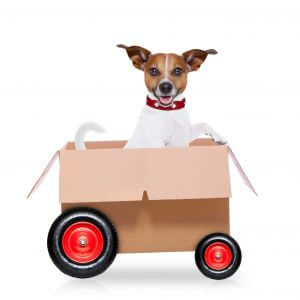 Moving is one of the most stressful events many of us will undergo. Spring and Summer are the two big moving times of the year; nobody would move in the cold and snow if they could help it! It can be physically and emotionally brutal no matter if you are downsizing (so much to get rid of) or upsizing (too many empty rooms). Just know, it’s not easy for your dog either.
Moving is one of the most stressful events many of us will undergo. Spring and Summer are the two big moving times of the year; nobody would move in the cold and snow if they could help it! It can be physically and emotionally brutal no matter if you are downsizing (so much to get rid of) or upsizing (too many empty rooms). Just know, it’s not easy for your dog either.
When we moved from New York to Colorado, I thought I had prepared my dogs. We stopped numerous times along the way (much to my husband’s chagrin) to let the dogs out and feed them. We did not feed them in the car so they wouldn’t be car sick. We brought along their favorite blankets, toys and bedding, so something would seem familiar. Before we even brought anything into the house, I let the dogs sniff around and moved all their stuff in.
I thought I had it all covered. That first night I was anxious, running all around the house in my zeal to get as much unpacked as possible. The dogs must have picked up on my anxiety. The first morning dawned in our new home only to discover that one of our dogs threw up all over the downstairs. All over the new carpeting no less!
Hmmm. Maybe I should have spent a little more time preparing.
Before You Move
- The minute you start packing the boxes, reassure your dog he will be going with you. Try and be as calm as possible or he will pick up on your anxiety. It’s the “energy” attached to what you are telling them versus the actual words.
- If your new home isn’t far away, familiarize your dog with the home and the scents of the new neighborhood. Or try to bring something from the new house to your dog so he can familiarize himself with its unique smell.
- Make sure to order your new pet identification tag with your dog’s name and your new address and contact information.
- The day of your move, hire a trusted friend or neighbor to watch your dog if possible. That way you won’t have to deal with him/her in all the chaos! Additionally, the movers will need the doors open providing the perfect chance for your dog to roam away.
- Bring familiar toys and bedding to your new home so everything won’t be strange and foreign for your dog.
- Research the vets in your area including those that are open 24/7.
After you Move
- Give the dog a VIP tour of your house. Let him investigate outside and inside. Walk him on a leash during this initial introduction so he feels safe and secure by your side.
- Make sure the fence or containment area doesn’t have any holes for him to escape.
- If possible, allow yourself a few extra days to spend at home with your pet after the move and before returning to work.Spend slightly longer of periods apart so he adjusts to the new smells and sights. Whatever you do don’t leave your dog outside during the adjustment period unless you’re sure there are no escape routes.
- Dogs love routines. Try to maintain a somewhat normal schedule of feeding and outings.
There is no easy answer how long it will take for your dog to adjust. Some dogs relax after only a few days whereas others can take weeks to adjust to their new environment.
Know that your dog may have some adjustment problems and be as patient as possible as he adjusts to his new surroundings! Some dogs may take moving in stride, but for others, it can be traumatic. Senior dogs, pets with illnesses and those who have had a very consistent lifestyle may be more sensitive to change. And I learned this the hard way … practice stress management on yourself or your dog will pick up on it!
